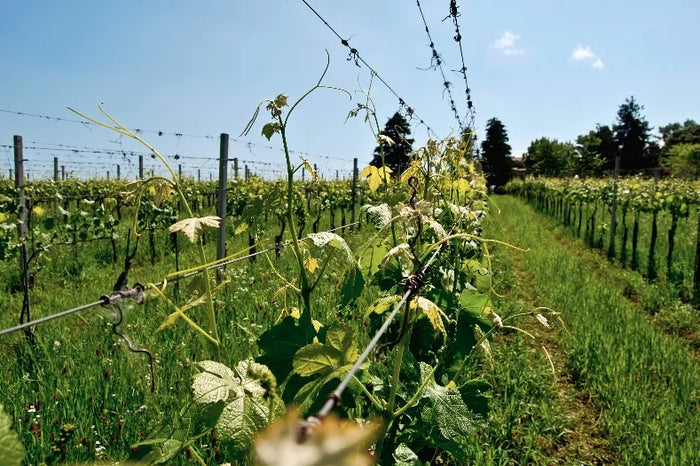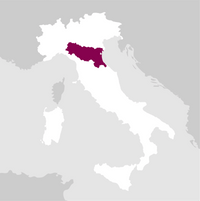Servir à :
16 - 18 °C.
Longévité :
05 - 10 ans
Temps de décantation :
1 heure

Producteur
Vigneto San Vito
De ce vignoble
igneto San Vito is located in the Colli Bolognesi, in the hamlet of Oliveto, at an altitude of 200 metres. There is ancient evidence of quality wines on this hill, dating back to medieval charters with the Abbey of Nonantola.
San Vito has been producing wine for some 50 years. Ever since my wife Carola and I took over in 2005, we have been committed to enhancing the typical wines of this area: we wanted to produce wines that were a strong expression of our terroir, that were distinguishable and not standardised.
We believe that biodynamic agriculture makes it possible to produce more original wines, more representative of the place where the vine is grown, thanks to its ability to revitalise the soil, stimulate the plants and produce fruit with a strong link to the terroir. The vines are not fertilised or irrigated, but the natural humus of a land that is alive again is obtained in a sustainable manner, through the rediscovery of ancient techniques.
The same approach is used in the cellar so as not to lose this heritage during the winemaking process. Fermentations are spontaneous with only indigenous yeasts without the use of selected ones, and the wines are not clarified or filtered. We believe that the metamorphosis from grape to wine must take place as naturally as possible, accepting the margin of unpredictability that this entails, and the different character that each vintage imparts.
More than a profession of faith or a marketing strategy, for us this is a choice of taste and a way of really feeling part of these places.
We think that the farm should tend towards the closed cycle, above all to establish an energy balance, strengthen the synergy between different crops and obtain as much biodiversity as possible. Lire la suite
San Vito has been producing wine for some 50 years. Ever since my wife Carola and I took over in 2005, we have been committed to enhancing the typical wines of this area: we wanted to produce wines that were a strong expression of our terroir, that were distinguishable and not standardised.
We believe that biodynamic agriculture makes it possible to produce more original wines, more representative of the place where the vine is grown, thanks to its ability to revitalise the soil, stimulate the plants and produce fruit with a strong link to the terroir. The vines are not fertilised or irrigated, but the natural humus of a land that is alive again is obtained in a sustainable manner, through the rediscovery of ancient techniques.
The same approach is used in the cellar so as not to lose this heritage during the winemaking process. Fermentations are spontaneous with only indigenous yeasts without the use of selected ones, and the wines are not clarified or filtered. We believe that the metamorphosis from grape to wine must take place as naturally as possible, accepting the margin of unpredictability that this entails, and the different character that each vintage imparts.
More than a profession of faith or a marketing strategy, for us this is a choice of taste and a way of really feeling part of these places.
We think that the farm should tend towards the closed cycle, above all to establish an energy balance, strengthen the synergy between different crops and obtain as much biodiversity as possible. Lire la suite


Viande
Fromages
Fromage affiné
Porc
| Name | Vigneti San Vito Pro.Vino 2020 |
|---|---|
| Type | Rouge tranquille |
| Denomination | VdT |
| Vintage | 2020 |
| Size | 0,75 l |
| Alcohol content | 13.5% par volume |
| Grape varieties | 50% Barbera, 50% Neretto |
| Country | Italie |
| Region | Émilie Romagne |
| Vendor | Vigneto San Vito |
| Origin | Sole and Bellavista |
| Climate | Altitude: 200 m. a.s.l. |
| Cultivation system | Spurred cordon |
| Plants per hectare | 3300 |
| Yield per hectare | 75 q. |
| Harvest | End of August with grapes at full ripeness. Exclusively by hand in small crates. |
| Wine making | Spontaneous fermentation without the use of selected yeasts in large Slavonian oak barrels. Filtration, forced stabilisation or clarification: none. |
| Aging | Maturation for 12 months in Slavonian oak casks and at least 6 months in bottle. |
| Allergens | Contains sulphites |





